Are you ready for an adventure of a lifetime? Scuba diving offers a unique and immersive experience, allowing you to explore the underwater world and witness stunning marine life up close. Planning and preparation are crucial for a safe and enjoyable scuba diving vacation, from selecting the right gear and obtaining the proper certification to finding the best diving locations and valuable tips. Let’s dive into the essential steps needed to prepare for the ultimate scuba diving vacation.
Key Takeaways
- Proper planning and preparation are essential for a safe and enjoyable scuba diving vacation.
- To scuba dive, you’ll need the right gear, proper certification, and knowledge of top diving locations.
- Scuba diving courses can help improve your skills and safety underwater.
- Always prioritize safety when scuba diving, such as dive planning and responsible interactions with marine life.
- Packing must-have scuba diving equipment and accessories can enhance your overall diving experience.
The Importance of Scuba Diving Certification
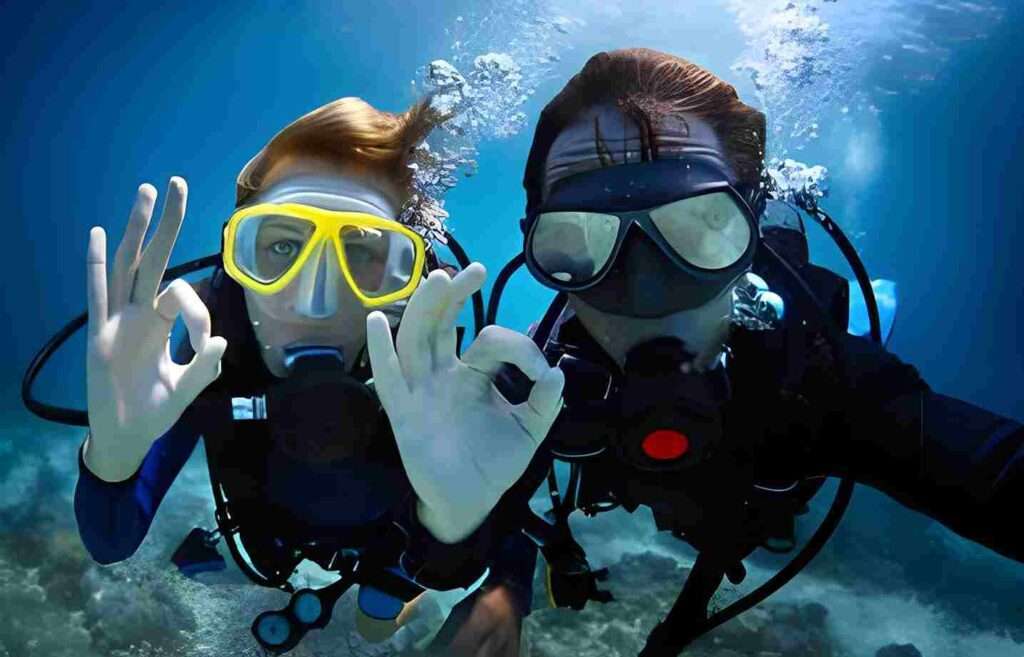
Scuba diving is an incredible experience that allows you to explore the wonderful world beneath the waves. However, before diving into the deep blue, obtaining proper scuba diving certification is essential for your safety and enjoyment.
Scuba diving certification effectively prepares you to handle the potential hazards and risks associated with this exciting activity. It teaches you the basics of SCUBA gear usage, decompression, and underwater navigation, among other things. The expertise you acquire through the certification course will allow you to experience scuba diving with confidence, preparing you for a lifetime of underwater exploration.
The two leading scuba diving certification programs are the Professional Association of Diving Instructors (PADI) and Scuba Schools International (SSI). Both programs offer comprehensive courses and provide certification upon completion. Certification courses range from a few days to several weeks, depending on your commitment, needs, and goals. Some basic requirements include learning the essential skills, passing written and practical exams, and logging the required diving hours.
| Certification Level | Description |
| Open Water Diver | This certification permits you to dive to a depth of 60 feet, allowing for independent diving with a buddy and renting scuba gear. |
| Advanced Open Water Diver | This certification improves your diving knowledge and skills beyond Open Water Diver, allowing you to explore deeper waters, night, wreck, and drift diving. |
| Rescue Diver | This certification trains you in rescue skills, preparing you to respond to diving emergencies confidently. |
| Dive Master | This certification helps you evolve from a recreational diver to a professional level, allowing you to enroll in instructor training, leading and supervising other divers, among other duties. |
Gaining certification gives you access to scuba diving locations worldwide, and comfortably hire scuba diving gear and equipment.
Takeaway: Properly obtaining certification enhances your overall diving experience, helping you confidently dive anywhere in the world with the knowledge, skill, and confidence necessary to stay safe and maximize enjoyment.
Finding the Right Scuba Diving Gear
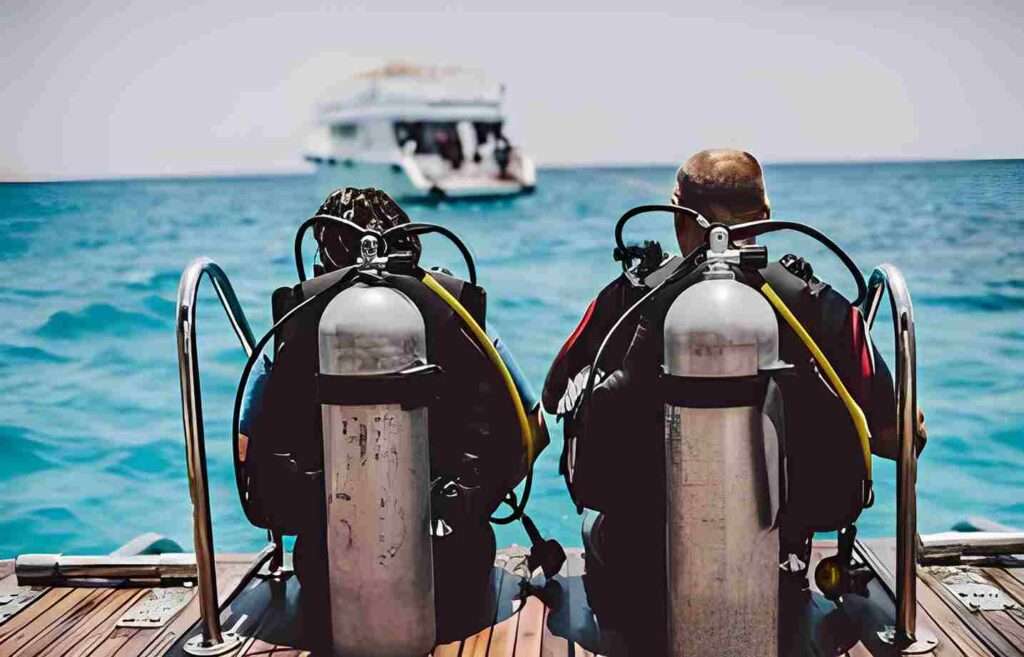
Scuba diving gear is essential to ensure utmost comfort and safety during your underwater adventure. Choosing the right scuba diving equipment can be overwhelming, but we’re here to provide valuable insights to simplify the process.
Wetsuits
A wetsuit is one of the most crucial pieces of scuba diving gear, providing thermal insulation and protection against cuts and scrapes. It’s essential to choose the right material and thickness based on the water temperature and your diving location. A high-quality wetsuit should fit snugly without restricting movement.
Masks
A high-quality mask is essential to ensure clear vision and a comfortable fit. It’s crucial to choose a mask that fits properly, without any gaps or leaks. Consider features such as lens type, volume, and fit before making your purchase.
Fins
Choosing the right fins ensures better control and movement underwater. It’s vital to choose fins that fit your feet correctly and offer the right level of flexibility for your diving requirements. Consider the design, material, and fit when purchasing a new set of fins.
Regulators
The regulator is the primary source of breathing air underwater. Choosing a high-quality regulator is essential for comfort and safety. Consider factors such as breathing resistance, durability, and ease of maintenance when selecting a regulator.
Care and Maintenance
Proper care and maintenance of your scuba diving gear is crucial to extend its lifespan and ensure optimal performance. Regularly rinse and dry your equipment after each dive and store it in a dry, cool place. Follow the manufacturer’s instructions for maintenance and professional inspections.
You can dive comfortably and safely in any environment with the right scuba diving gear. Remember to invest in high-quality gear that fits you well, and take the time to maintain it properly. Follow our tips for choosing and maintaining your gear to enhance your scuba diving experience.
Scuba Diving Lessons: What to Expect
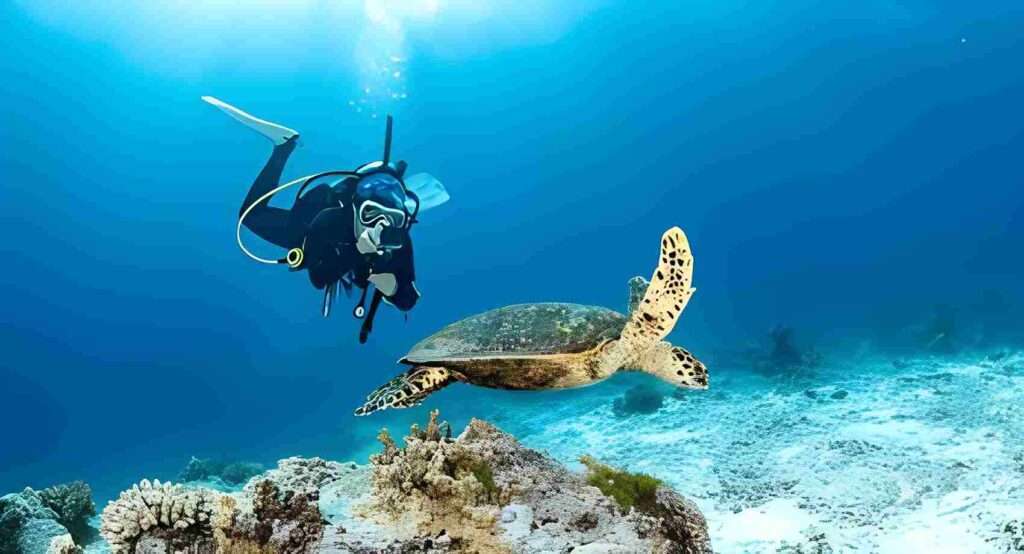
Are you excited to immerse yourself in the underwater world of scuba diving, but unsure of what to expect during scuba diving lessons? Let’s explore what you’ll encounter when taking scuba diving lessons.
Classroom Instruction
Scuba diving lessons typically begin with classroom instruction, where you’ll learn the basics of scuba diving, including safety procedures and diving equipment. You’ll also receive information on dive planning, buoyancy control, and underwater communication.
Pool Sessions
After completing classroom lessons, you’ll move to the pool, where you’ll learn fundamental scuba diving skills, such as breathing underwater and proper buoyancy techniques. The controlled environment of the pool allows you to practice these skills in a safe and comfortable setting.
Open Water Dives
Finally, you’ll complete open water dives, which involve applying the skills learned in the classroom and pool to open water environments. During these dives, you’ll experience the thrill of diving in natural bodies of water and observe marine life in their natural habitat, all while under the guidance of experienced instructors.
Choosing a Reputable Scuba Diving School
When selecting a scuba diving school, it’s essential to choose a reputable provider with experienced instructors and modern equipment. Research potential schools and read reviews from past students to ensure a positive experience.
Remember, scuba diving lessons and certification are essential to ensure safety and maximize enjoyment for you and those around you during your underwater adventures.
Top Scuba Diving Locations Around the World
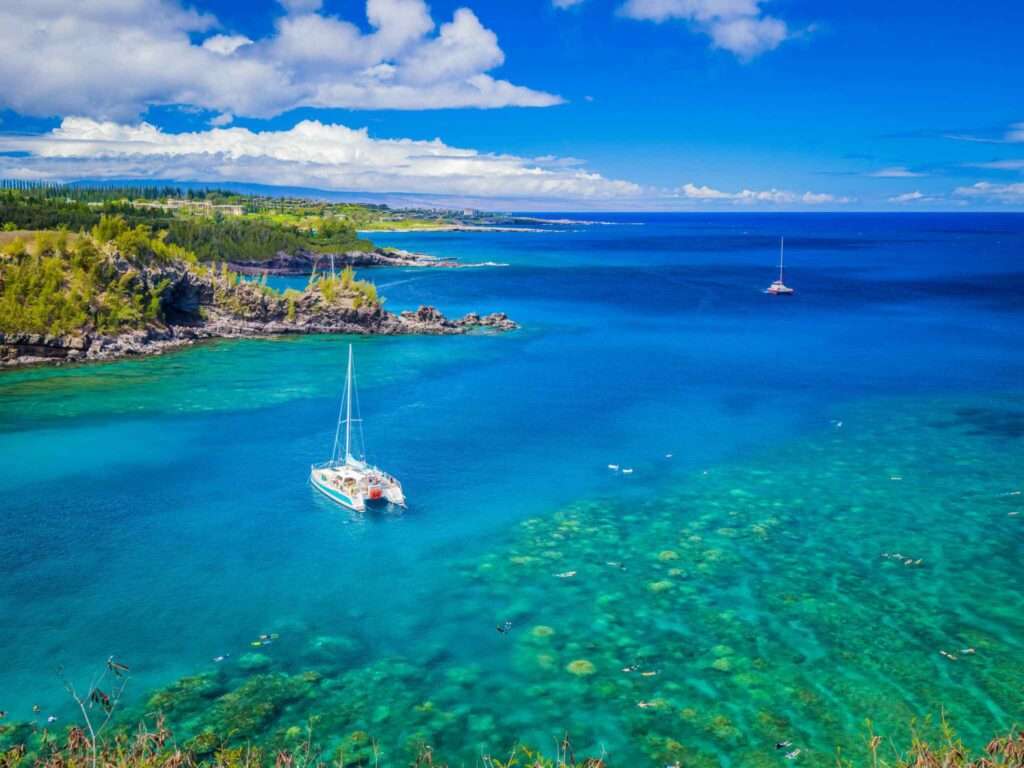
If you’re a scuba diving enthusiast, the world is your oyster. With countless spectacular destinations to choose from, we’ve narrowed down some of the best scuba diving locations worldwide for you. From the vibrant coral reefs of French Polynesia to the historical shipwrecks in the Red Sea, there’s something for every type of diver.
1. Great Barrier Reef, Australia
| Depths | Visibility | Marine Life |
| 10-30m | 15-30m | Colorful coral reefs, sea turtles, tropical fish, sharks, rays, whales |
The Great Barrier Reef, located off the coast of Queensland, is the largest coral reef system worldwide, stretching over 2300km. The warm, crystal-clear turquoise waters and diverse marine life make it a top must-visit destination for scuba diving.
2. Bora Bora, French Polynesia
| Depths | Visibility | Marine Life |
| 5-30m | 20-40m | Coral gardens, turtles, eagle rays, barracudas, lemon sharks |
Bora Bora, known for its stunning overwater bungalows, is also a dream destination for scuba divers. The warm waters of the lagoon offer fantastic visibility, with options for both beginner and advanced divers.
3. Galapagos Islands, Ecuador
| Depths | Visibility | Marine Life |
| 5-40m | 7-20m | Hammerhead sharks, sea turtles, marine iguanas, sea lions, penguins |
The Galapagos Islands, located off the coast of Ecuador, offer a unique diving experience with an abundance of rare marine life. Due to its isolation, the marine life here is unafraid of humans, allowing for an up-close and personal encounter.
4. Blue Hole, Belize
| Depths | Visibility | Marine Life |
| 30m+ | 30m+ | Stalactites, reef sharks, groupers, tunas, octopuses |
The Blue Hole, situated in the Caribbean Sea off the coast of Belize, is a unique sinkhole known for its deep descents and unusual stalactite formations. The dive here is suitable for advanced divers due to the depths of the hole.
5. Ras Mohammed National Park, Egypt
| Depths | Visibility | Marine Life |
| 5-40m | 20-30m | Colorful soft and hard corals, barracudas, sharks, turtles, dolphins |
Ras Mohammed National Park, located at the tip of the Sinai Peninsula in Egypt, offers an unforgettable diving experience with an astonishing variety of marine life and coral species. The location also features several famous shipwrecks.
Exploring the underwater world is an unparalleled experience. Book a trip to one of these top scuba diving locations for an adventure of a lifetime.
Tips for Safe and Enjoyable Scuba Diving
Scuba diving is an exciting experience, but it’s vital to prioritize safety to ensure a memorable and enjoyable dive trip. In this section, we provide essential tips to help you prepare for a safe and fun scuba diving experience.
Dive Planning
Before diving, it’s crucial to plan your dive thoroughly. Check the weather conditions, the water temperature, and the visibility level. Ensure that your dive plan includes a maximum depth limit and a maximum dive time, as well as an emergency plan in case of unexpected issues. It’s also crucial to follow the diving rules and regulations of the location you’re diving in to prevent accidents and damage to the environment.
Buddy System
The Buddy system is an essential safety measure in scuba diving. Always dive with a partner, and know each other’s diving skills and comfort levels. Ensure to carry a dive flag, so you’re visible to other boats. Maintaining constant communication with your buddy throughout the dive is also critical. In case something goes wrong, your buddy is the first one to assist you.
Emergency Procedures
Even with proper planning and precautions, emergencies can occur when scuba diving. Knowing how to handle an emergency is vital. As a diver, ensure you have an emergency action plan and know the appropriate responses. Be prepared to respond to emergencies such as equipment failure, getting lost, or running out of air. It’s also essential to know the potential symptoms of nitrogen narcosis, altitude sickness, and other possible diving-related conditions.
Buoyancy Control
Proper buoyancy control is essential to avoid accidents while diving. Buoyancy affects your body’s position in the water and depth control. Ensure you’re wearing the appropriate weight to keep proper buoyancy underwater to prevent accidental injuries or damage to the marine environment. Regularly practice buoyancy control by adding and subtracting air from your BCD (Buoyancy Control Device).
Interacting with Marine Life
Scuba diving allows for up-close interactions with fascinating marine life. However, interactions should be respectful, and divers should never touch or disturb them. The marine environment is fragile, and divers should take care to avoid causing damage to coral reefs or other underwater habitats.
By following these tips, you can have a safe and unforgettable scuba diving experience. Keep in mind that these are just general guidelines, and it’s always best to undertake further research and consult professional divers or instructors before diving in unfamiliar locations or situations.
Planning an Unforgettable Scuba Diving Vacation
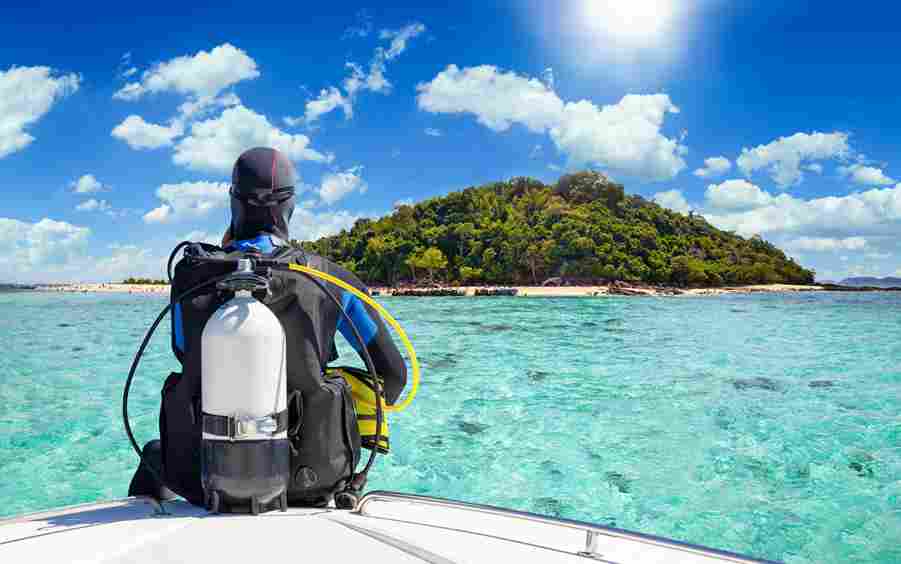
Are you dreaming of an adventure-filled scuba diving vacation? Planning the ultimate dive trip requires careful consideration to ensure a memorable and safe experience. Let’s explore some of the essential factors to consider when organizing your dream dive trip.
Setting a Budget
Before planning any travel, it’s essential to set a budget that includes factors like travel costs, dive fees, and equipment rental. If you’re planning to travel abroad, consider currency exchange rates and anticipate additional expenses like travel insurance and visas.
Transportation
Choose a destination that’s accessible and convenient for you and your travel companions. Consider flight and transportation options to and from the diving location. If you’re traveling abroad, make sure you understand the vaccination requirements and other health considerations that could affect your transportation decisions.
Accommodation Options
Check out accommodation options near the diving location, such as hotels, resorts, and vacation rentals. Consider the proximity to the diving location, amenities, and budget. You may also want to check reviews and ratings before booking.
Selecting Dive Operators
Choosing an experienced and reputable dive operator is essential for your safety and enjoyment. Research local dive centers and dive operators who offer guided dives and gear rental options. Check their online reviews, certification, and experience level before you make a choice.
In summary, proper planning and preparation are vital for creating an unforgettable scuba diving vacation. Setting a budget, arranging transportation, selecting accommodation options, and choosing the right dive operator are essential factors to consider. With this in mind, you can enjoy the excitement and adventure of exploring the underwater world on your next scuba diving vacation.
Scuba Diving Courses: Advancing Your Skills
Becoming a certified scuba diver doesn’t mean your learning journey has to end. One of the best ways to improve your skills and knowledge is by taking additional scuba diving courses. Not only will it make you a better diver, but it will also allow you to explore specific interests and pursuits in this exciting activity.
Advanced Scuba Diving Courses
There are various advanced scuba diving courses that you can take to expand your diving capabilities and knowledge. Here are some of the most popular courses:
| Course | Description |
| Underwater Photography Course | Learn how to take stunning photos of the underwater world and capture marine life images that will take your breath away. |
| Deep Diving Course | Discover the thrill of diving deeper and learn how to plan and execute dives down to depths of up to 40 meters (130 feet). |
| Wreck Diving Course | Learn how to safely explore sunken shipwrecks and gain valuable knowledge about the fascinating history behind them. |
Each advanced scuba diving course has specific knowledge and skills requirements. Therefore, it’s essential to research the course curriculum, prerequisites, and the required certification level before signing up.
Specialty Scuba Diving Courses
If you’re interested in a particular diving area, you can pursue specialty scuba diving courses. These courses are designed to train and certify you in specific areas of diving, such as night diving, drift diving, and search and recovery diving. By taking these courses, you can become an expert in a particular diving niche.
Must-Have Scuba Diving Equipment for Your Vacation
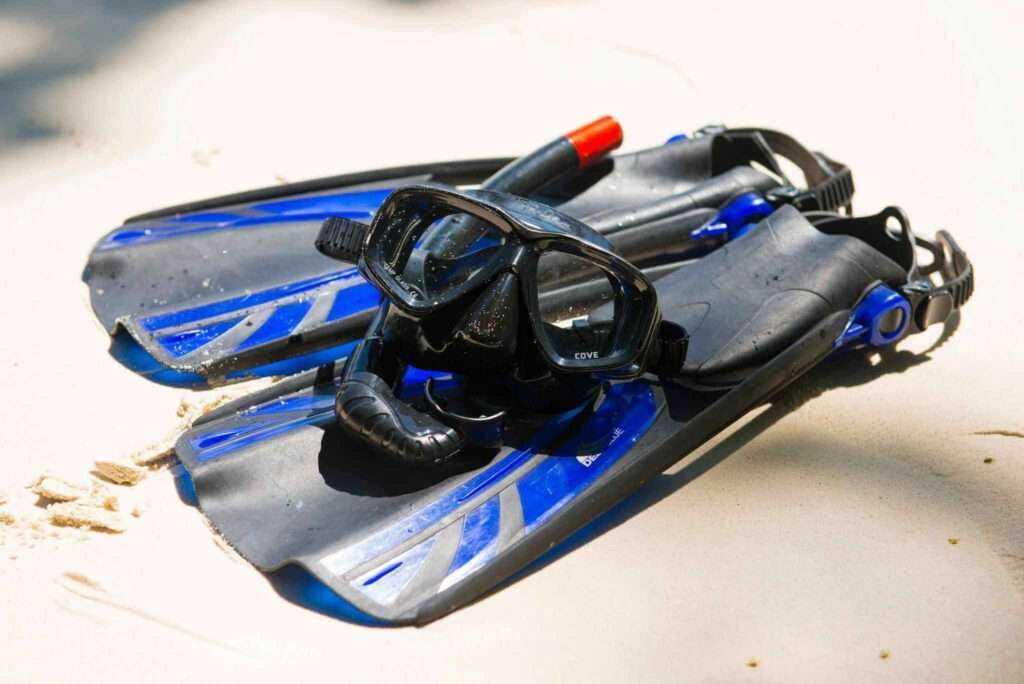
When planning your scuba diving vacation, it’s essential to pack all the necessary scuba diving equipment, such as wetsuits, masks, fins, and regulators. But in addition to the essentials, several must-have accessories can enhance your underwater experiences. Here’s what to pack:
| Accessory | Description |
| Underwater Camera | Capture stunning photos and videos of the underwater world to preserve your memories and share with friends and family. |
| Dive Computer | Keep track of your dive time, depth, and oxygen levels, ensuring a safe and enjoyable diving experience. |
| Dive Light | Illuminate your path in deep and dark waters, enhancing the visibility of marine life and underwater landscapes. |
| Dive Bag | Carry and protect your diving gear easily and conveniently, ensuring that everything stays organized during travel. |
Having these accessories can transform your scuba diving vacation from great to unforgettable. Pack them with your essential gear, and get ready for a thrilling underwater adventure!
Conclusion
Scuba diving is a fascinating and rewarding activity that offers a chance to explore the underwater world and uniquely connect with nature. By following the essential planning and preparation steps, obtaining scuba diving certification, finding the best diving locations, and packing the right gear, you can make the most of your scuba diving vacation.
Remember to prioritize safety above everything else, and always dive with a trusted partner or group. Respect the marine life and their natural habitat, and take only memories and photos, leaving nothing but bubbles.
Whether you’re an experienced diver or a beginner, scuba diving offers a thrilling adventure that promises to leave you with unforgettable memories. So, plan your next dive trip, get ready to explore the breathtaking underwater world, and immerse yourself in a world of wonders.
FAQ
Why is scuba diving certification important?
Scuba diving certification is essential for your safety and enjoyment underwater. It ensures you have the necessary skills and knowledge to handle different diving situations and equipment properly.
How do I obtain scuba diving certification?
To obtain scuba diving certification, you need to enroll in a scuba diving course offered by a recognized diving organization. The course typically involves classroom instruction, pool sessions for skill practice, and open water dives to demonstrate your abilities.
What scuba diving gear do I need?
The essential scuba diving gear includes a wetsuit, mask, fins, and a regulator. It’s important to choose gear that fits well and suits your diving preferences. Other optional gear may include a dive computer, dive light, and underwater camera.
How do I select the right scuba diving school?
When selecting a scuba diving school, look for one that is accredited by a recognized diving agency. Consider factors such as the instructor’s experience, class size, safety record, and teaching methodology. Reading reviews and seeking recommendations can also be helpful.
What are some popular scuba diving locations?
Some popular scuba diving locations around the world include the Great Barrier Reef in Australia, the Maldives, the Red Sea in Egypt, Cozumel in Mexico, and the Galapagos Islands in Ecuador. Each location offers unique marine life and stunning underwater landscapes.
How can I stay safe while scuba diving?
To stay safe while scuba diving, it’s important to plan your dive, dive with a buddy, and follow proper dive procedures. Maintain good buoyancy control, monitor your air supply, and be aware of your surroundings. Familiarize yourself with emergency procedures and always dive within your limits.
What should I consider when planning a scuba diving vacation?
When planning a scuba diving vacation, consider factors such as your budget, transportation options to the diving location, accommodations near the dive site, and the reputation of dive operators in the area. Research the diving conditions, marine life, and other attractions available at your chosen destination.
What advanced scuba diving courses are available?
Advanced scuba diving courses offer specialized training in areas such as underwater photography, deep diving, wreck diving, and nitrox diving. These courses can enhance your diving skills and provide opportunities to explore more challenging dive sites.
What additional scuba diving equipment should I pack for my vacation?
Besides the essential gear, consider packing additional equipment such as a dive computer, underwater camera, dive light, dive knife, and a dive bag for carrying your gear. These accessories can enhance your diving experience and capture precious memories.
